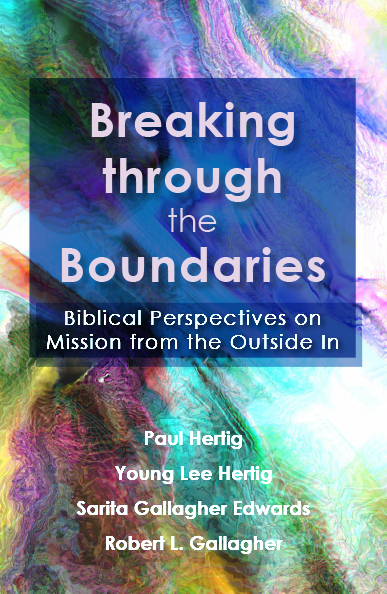About Our People
 Sarita Edwards (Christian Studies) coauthored a book, Breaking through the Boundaries: God’s Mission from the Outside In, published this fall through Orbis Books. In it, four experienced missiologists draw upon biblical narratives to highlight key roles played by those outside established Jewish/Christian religious tradition in the service of God’s mission. The authors apply the missiological insights gleaned from the biblical accounts to contemporary issues such as global migration crises and interreligious strife. Coauthoring the book were Azusa Pacific University’s Paul Hertig and Young Lee Hertig, and Robert L. Gallagher from the Wheaton College Graduate School.
Sarita Edwards (Christian Studies) coauthored a book, Breaking through the Boundaries: God’s Mission from the Outside In, published this fall through Orbis Books. In it, four experienced missiologists draw upon biblical narratives to highlight key roles played by those outside established Jewish/Christian religious tradition in the service of God’s mission. The authors apply the missiological insights gleaned from the biblical accounts to contemporary issues such as global migration crises and interreligious strife. Coauthoring the book were Azusa Pacific University’s Paul Hertig and Young Lee Hertig, and Robert L. Gallagher from the Wheaton College Graduate School.
Paige Parry (Biology) and two George Fox biology alumni, Elizah Stephens and Chris Murar, collaborated with Daniel Tinker from the University of Wyoming to publish a paper, “Environmental determinants of recruitment success of subalpine fir (Abies lasiocapra) in a mixed-conifer forest,†in Western North American Naturalist, a peer-reviewed scientific journal focusing on biodiversity and conservation in western North America.
Ed Higgins (Writer in Residence and English Professor Emeritus) published a haibun, “Syntax Connections,†in the most recent issue of the online journal Failed haiku (a Journal of English Senryu).
Don Powers (Biology) coauthored an article, “The allometry of daily energy expenditure in hummingbirds: an energy budget approach,” accepted for publication in the Journal of Animal Ecology. In it, the authors suggest that the unusually high energy cost of flight (including hovering) explains why daily energy expenditure increases with body size faster in hummingbirds than it does in any other warm-blooded animal.
Jennifer Lehman (Business) presented “Faith, Stewardship and Legacy Planning (and tax benefits for you)†at the First Presbyterian Church in Newberg on Nov. 24.
Kent Yinger’s (Seminary) book, God and Human Wholeness: Perfection in Biblical and Theological Tradition (Cascade, 2019), was released in October. In it, Kent argues that God intends flourishing and wholeness for his human creation rather than “perfection.â€
